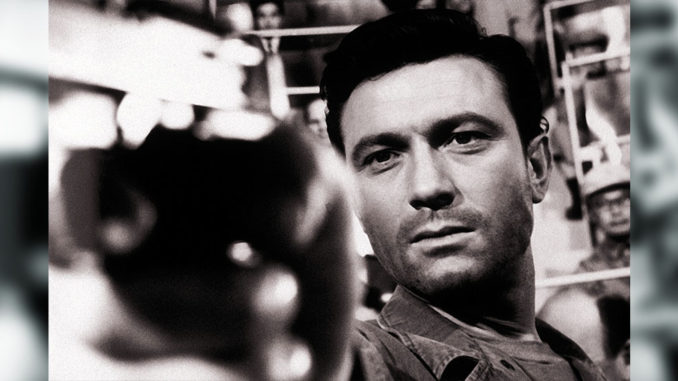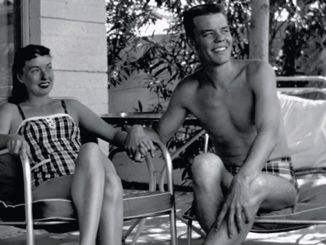
by Kevin Lewis
PBS has been reviving some key films about threats to democracy, perhaps in an attempt to alert us that a society deconstructs from within, and possibly to call attention to its own constraints enacted by the Federal Communications Commission (FCC). What links Judgment at Nuremberg (1961), All the President’s Men (1976) and The Manchurian Candidate (1962)? Judgment indicates that Nazism was legitimized by collusion between judges and government officials. All the President’s Men shows how dirty tricks and disinformation by an incumbent president befouled the election process. The Manchurian Candidate reveals how the two sides of extremism can destroy centrist politics. While the first two are reportorial narrative, Candidate has a comic book sensibility fused with the pulp political espionage novel genre.
When the film version of the Richard Condon novel was released 45 years ago in October 1962, Americans had scarcely exhaled from the Cuban Missile Crisis the month before. On the surface, its convoluted plotline is almost laughable: A Chinese-controlled assassin (Laurence Harvey), who was a Korean War Medal of Honor winner, is directed by his closet Communist mother (Angela Lansbury), who herself is the wife of a red-baiting senator, to kill her political opponents. What mesmerized audiences and suspended disbelief were the film noir and German Expressionist elements of the film. German Expressionism, as demonstrated in such film classics as The Cabinet of Dr. Caligari (1920), Dr. Mabuse (1922), Metropolis (1927) and M(1931), released the primal and mythic urges and fears in viewers as it depicted master criminals and psychotics who were intelligent and disturbingly sympathetic—all to our horror.
Raymond Shaw (Harvey) commits eight murders with his rifle, including his suicide, in a chilling forecast of our nightly news in 2007. The Manchurian Candidate was the film Fritz Lang never made, but with which John Frankenheimer proved himself a master of the political espionage genre. What mystified the 1962 audience seems prescient and all-too-believable now. Who would have thought that 45 years later, a president would campaign for Homeland Security against Middle Eastern terrorists, yet at the same time authorize our ports to be supervised by a Dubai-owned company? And who could have conceived of a CIA agent accusing the White House of leaking her identity in retaliation for criticism of a build-up to war?
John Frankenheimer was a realistic, almost documentary-like director, but Ferris Webster’s editing aided him in expressing the psychological states of the characters.
The film’s most enduring character is Mrs. Iselin, Shaw’s mother, played by Lansbury in one of the finest, chilling performances ever captured on film. The character, who gives her only child to the Communist cause (in a scene that plays like a twisted Christ and Virgin Mother reference), has been debated by critics for decades. In the pre-feminist era of 1962, the character was regarded as the symbol of Momism, the castrating mother threatening the macho ideal. In the feminist era, she represented the empowerment of the frustrated senator’s wife. When Jonathan Demme remade the film in 2004, he validated that interpretation by making Mrs. Iselin the senator, played by Meryl Streep as Eleanor Shaw. In fact, Lansbury’s earlier portrayal of the glacial newspaper mogul as presidential kingmaker in State of the Union (1948) is a kind of sister to Mrs. Iselin.
Matching her is Harvey, whose ruthless quality makes Shaw a perfect Expressionist character. Mother and son cannot help being primal reptiles. The tip-off that The Manchurian Candidate is actually a partial remake of Caligari is the scene in which the doctor and the Chinese agent discuss the hit-man murders that Shaw will commit for them while under hypnosis––as Shaw lies sleeping in the same room.
Frankenheimer was a realistic, almost documentary-like director, but Ferris Webster’s editing aided him in expressing the psychological states of the characters. Webster, who died in 1989, was nominated for an Academy Award for his razor-sharp cutting and subsequently edited two of Frankenheimer’s most revived films, Seven Days in May (1964) and Seconds (1966). During his 40-year career, Webster excelled at dream or hallucinatory sequences in such classics as The Picture of Dorian Gray(1945), Madame Bovary (1949), Father of the Bride (1950), The Great Escape (1963) and, of course, The Manchurian Candidate. No one who ever saw the latter movie can forget the brainwashing sequence of American POWs, which shifts back and forth from an interrogation seminar to a garden luncheon of big-hatted ladies.
The Manchurian Candidate passed into legend and was unseen for over 20 years after its co-star, Frank Sinatra, bought the rights a few years later and withheld it from distribution because of the cycle of recent political assassinations, which included President John F. Kennedy, Senator Robert F. Kennedy and the Reverend Martin Luther King, Jr.
Finally emerging in 1987 from a sleep in the vault, it was evident that back in 1962, the film depicted the future in plain sight. The Manchurian Candidate warned that patriotism is not only the last refuge of the scoundrel—but of the traitor as well.





